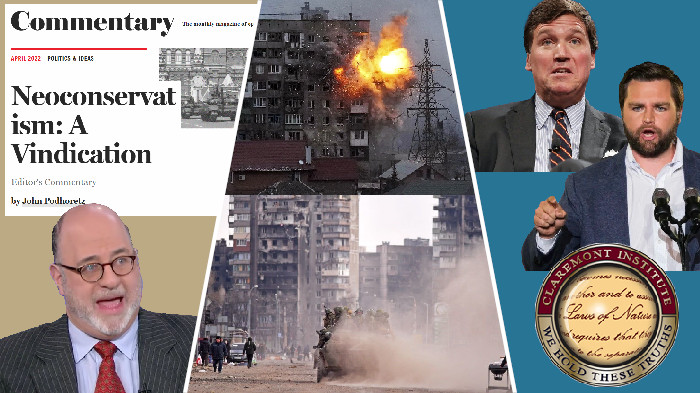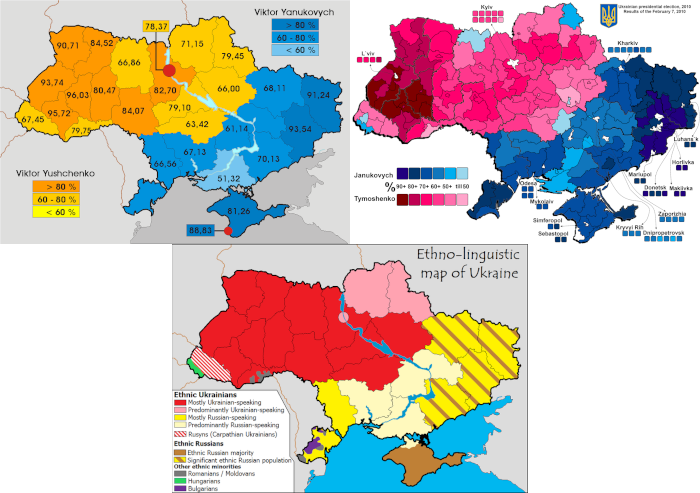Despite what you're hearing, we were right about Ukraine, and foreign policy in general

Russia's invasion of Ukraine has led to a lot of crowing and backlash back home. Basically, the war is seen as a repudiation of the Trump administration and populists like Tucker Carlson's crusade against the US foreign policy mainstream and its predilection for war and foreign interventionism. You can find this point of view in the piece "Neoconservatism: A Vindication" at the neoconservative magazine Commentary, and all over social media as well. Here's another big powerful country waging a shocking war for once. That's potent stuff, and the establishment is striking back, hard.
One of the critical questions to answer here is: were we too tough or not tough enough? They would say that Russia's actions speak for themselves, that it proves their ill-intentions — just assumed to have always been there — and that we needed to have opposed them more forcefully. Unfortunately for the hawks, there's a history here that makes things more complicated. This was an avoidable war, or at least, its likelihood was fueled by years of inconsiderate and aggressive actions towards Russia. It's not a question of condoning their actions or sympathizing with them but it was the decisions made by these same people that caused this to happen, and that undermines everything they say.
I don't claim to be an expert on this region and its history but I think we can do a decent job of reviewing much of what led up to this all the same.
One of the things you hear the most is that it was the expansion of NATO after the end of the Cold War that provoked this. That's definitely part of it. More generally though, it's as stated, that the US engaged in inconsiderate and aggressive actions towards Russia for years — inside Ukraine of all places, a country widely seen as having great strategic and civilizational importance to Russia — pushing them deeper and deeper into a corner, and what was warned would happen did.
The expansion of NATO specifically is a problem too though. After having won the Cold War, a victory clearly marked by the spectacular collapse of the Soviet Union and the ending of communism, its raison d'etre gone, not only did NATO not go away, it creeped ever closer towards Russia's borders. A defense you hear for this is that the newly joined countries wanted this, and the question is often put, is that not their right to decide? It may be but there are wider geopolitical consequences to them doing so, to serving the interests of the major hostile power that is the US, as it's seen from the perspective of Russia.
Military alliances are for specific purposes, and known through history for causing problems (e.g. WWI), so none of this should be new. Further, NATO can be fairly seen as an arm of American power. Obviously the US dominates the organization, based on the fact its military capability dwarfs all other members, and it doubtless has leverage through other means. The alliance's Article V, which calls for members to come to the collective defense of any country that's attacked, was invoked for the first and only time in response to the 9/11 attacks in New York and Washington D.C. That action would lead to the participation of the armed forces of many Western countries in the Afghanistan War, where many of these soldiers were killed or injured. That's not the behavior of some sort of defensive military alliance of no particular persuasion, it's American power.
When George W. Bush spoke openly of his desire to see Ukraine and Georgia become members during his administration (this has been described as exaggerated but it was the stated intent of the Bush admin), against the warnings of France and Germany, it was likely more inconsiderate than deliberately hostile to Russia. Adding more countries to the alliance means more power and influence for the US, but like many things done by the Bush admin, this agenda was reckless and unnecessary.
A recurring problem in the mainstream understanding of Ukraine is the failure to appreciate that it is in fact a divided country, the main division being between ethnic Russian and Russian-speaking people in the southeast of the country and the more ethnically and linguistically Ukrainian and pro-Western western half. This pattern has repeatedly come up in the distribution of support for the two main wings of Ukrainian politics in multiple national elections.

The Ukrainians dispute this and argue that those divisions are overplayed by Russia for political reasons. They say that in the 1991 referendum over 90% of Ukrainians voted for independence. But it's a fact that these divisions keep coming up in a big way, and particularly so in Crimea, the most genuinely pro-Russian part of the country, having the highest share of ethnic Russians and a genuinely short history as part of Ukraine, being added only in 1954. The referendum Russia held to annex the territory may not have been up to standard but there's good reason to think it did reflect the majority view there.
It's understandable that Ukraine would be reluctant to cede any of its territory but there have been provocations with respect to their continued claim to Crimea. Soon after Russia's takeover of the region Ukraine dammed the canal that had provided around 90% of its water (this is a Soviet-era canal that brings fresh water from the Dnipro/Dnieper in mainland Ukraine to the naturally arid peninsula). The water crisis in Crimea had grown more severe in recent years and just this was suggested as a possible flashpoint in a future war. When Russia did invade one of the first things they did was destroy this dam. There's little to no evidence of the US challenging the Ukrainians on this, and as with other provocative moves like President Zelensky's banning of pro-Russian media, the US has even urged them on, in conflict with more moderate international voices.
The Euromaidan revolution though is where things really kicked off. The protests started immediately after Yanukovych suspended preparations for an EU trade deal, with large turnouts at Kyiv/Kiev's Independence Square. The protests would go on for months and be characterized by considerable violence. Protesters repeatedly stormed government buildings, fighting through heavy police lines, and made use of Molotov cocktails, commandeered vehicles, and at one point even some archaic firearms. Reminder too that Yanukovych was a duly elected leader — something no one disputes — in what was supposed to be a working democracy. Whether this behavior counts as an outrageous assault on democracy or a good thing depends on the country, and in fact the visuals even bring to mind January 6th, in the rare sight of large crowds of people standing their ground, directly brawling with massed police and, again, storming government buildings.
This was a pretty provocative movement for the US to support so strongly and be so intimately involved with. Russia itself would publicly expose some of this US meddling when they leaked a tape of Assistant Secretary of State Victoria Nuland' saying “fuck the EU” in dismissal of Europe's role in things (the whole issue at the core of the conflict was supposed to be the denial of Ukraine's wish to join the EU). The US deliberating over who would make up the post-revolutionary Ukrainian government was revealed as well. And that was what they did behind the scenes, there was no attempt to hide powerful US politicians John McCain and Democratic Senator Chris Murphy speaking directly at Maidan and Victoria Nuland even handing out food and cookies to demonstrators.
So that's the history — much of it anyway. Does it make what Russia's done right? No, but it explains how Russia was pushed into a corner and predictably reacted this way. This is something political scientist John Mearsheimer and others famously warned about, as would anyone who actually paid attention to things. The neocons have crowed about the invasion but it's fairer to say that it was only due to their belligerent foreign policy that it happened in the first place. It just reflects the lopsided balance of power between us where these people can be spectacularly wrong about things over and over but anything happens that suits their perspective and we never hear the end of it.
It's not even clear that the neocons cared that much about Russia before this. In the famous Obama-Romney debate moment where in response to Romney answering that Russia was the US's #1 geopolitical rival Obama quipped that "the 80s called, they want their foreign policy back," if you watch the full context he's talking more about Russia's support for Iran than any direct threat from them. It's revisionist history to pretend that the vast majority of aggressive neocon foreign policy had anything to do with countering an inevitable Russian invasion.
So the answer is yes, we've always been right. Russia's invasion of Ukraine is undoubtably an awkward issue for those of us in favor of the US pulling back from the rest of the world, but it didn't need to happen and likely wouldn't have happened if we were in charge.
Revisions:
Rewrote bits and pieces throughout. Aug 27, 2023
Made a few small changes. The substance of the piece is as it was when first published. Apr 5, 2023
